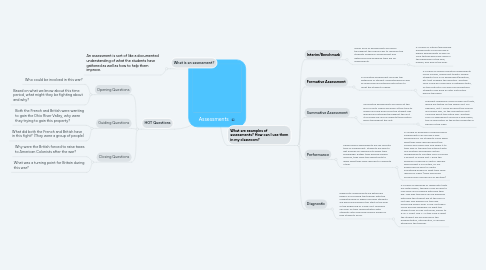
1. What is an assessment?
1.1. An assessment is sort of like a documented understanding of what the students have gathered as well as how to help them improve.
2. HOT Questions
2.1. Opening Questions
2.1.1. Who could be involved in this war?
2.1.2. Based on what we know about this time period, what might they be fighting about and why?
2.2. Guiding Questions
2.2.1. Both the French and British were wanting to gain the Ohio River Valley, why were they trying to gain this property?
2.2.2. What did both the French and British have in this fight? (They were a group of people)
2.3. Closing Questions
2.3.1. Why were the British forced to raise taxes to American Colonists after the war?
2.3.2. What was a turning point for Britain during this war?
3. What are examples of assessments? How can I use them in my classroom?
3.1. Interim/Benchmark
3.1.1. These form of assessments are given throughout the school year to measure the students academic achievement and determine how prepared they are for assessments.
3.1.1.1. A couple of interim/benchmark assessments could include 6 weeks assessments as well as MAP testing which are done in the beginning of the year, middle, and end of the year.
3.2. Formative Assessment
3.2.1. A formative assessment involves the gathering of student understanding as well as improving and altering instruction to meet the student's needs.
3.2.1.1. A couple of simple formative assessments could include, simple exit tickets. Where students turn in an assignment/question, etc. that answers the question. Another form could be a pop quiz in between tests, so the instructor can see misconceptions students may have an alter instruction before the exam.
3.3. Summative Assessment
3.3.1. Summative assessments are given at the end of units. These are given at this time to assess and see how much the student has learned and retained throughout the unit. It includes any and all aspects/information given throughout the unit.
3.3.1.1. Different examples could include unit tests, which are tested on the whole unit. For example, unit 1 could be about the French and Indian War, so the summative unit 1 could be about the entire War. Another form of assessment could be a final exam, this is summative of the entire semester or period of the class.
3.4. Performance
3.4.1. Performance assessments are my favorite type of assessment. Students are able to get a hands on approach to apply their knowledge. Rather than picking answer choices, they have the opportunity to apply what they have learned to complete a task.
3.4.1.1. A couple of examples of performance assessments can include a play performance. My students could apply what they have learned about the French and Indian War and apply it to their play in the way the interact with one another and handle certain disagreements. Another form could be a project of some sort. I have the pleasure of having a Mentor Teacher who bought 3-D Printers, so our kiddos will be able to create something based on what they have learned in class! (They should be arriving soon and we are so excited!)
3.5. Diagnostic
3.5.1. Diagnostic assessments are extremely helpful in providing the teacher with the understanding of where and how students are performing before the start of the year or the beginning of a new unit. Teachers can plan on their differentiation with students after planning lessons based on how students score.
3.5.1.1. A couple of examples of diagnostic tests are data folders, teachers may be able to look back and compare with how they did. This way teachers can be prepared with how the student did at the end of last year and prepare for the new upcoming school year. A pre-unit exam could provide feedback on what the student may or may not know, similar to K-W-L chart. The "L" in this case is what the student will be learning in the differentiation, intervention, or lessons altered by the teacher.

